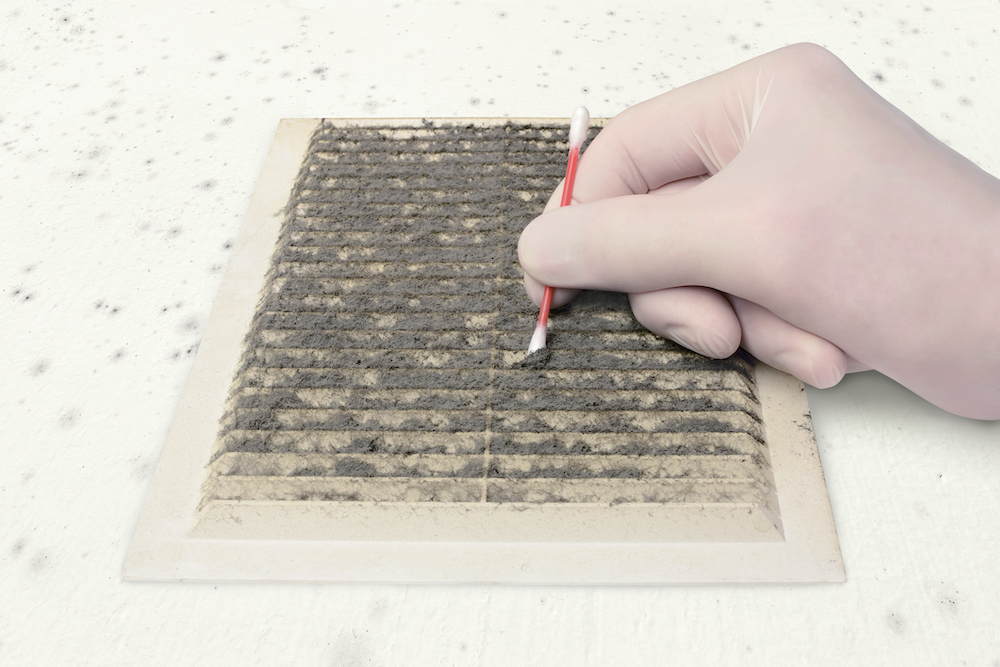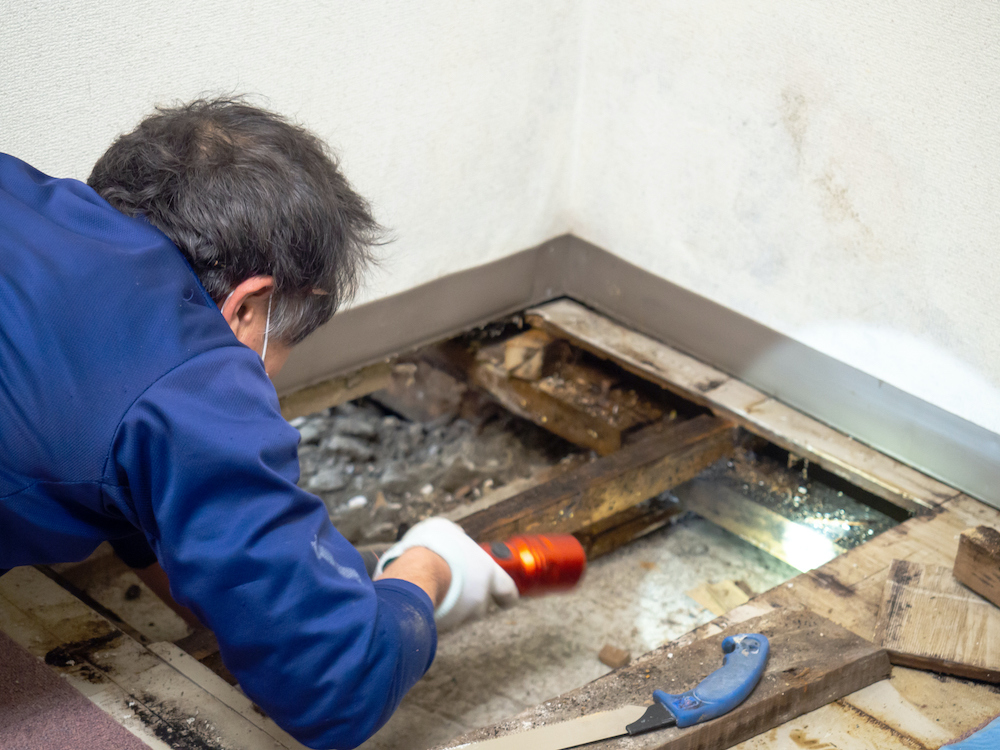Colorado Mold Testing
Most people know that extensive mold in their home or place of business can pose a danger to their health and the health of their family members or employees. While those large growths can certainly be scary, in reality, any level of mold should cause concern.
If you suspect that there is mold growing in your home or commercial building, schedule mold testing services with A Better Home Inspection right away.
A Better Home inspection provides professional mold inspections. When you’re dealing with mold, quick remediation is the key. Mold is a fast-growing fungus that produces spores that continuously float into the air. Constant exposure to these spores can have serious consequences to your health and your property.
Mold and Your Health– Not every type of mold is dangerous to human health, but some forms are toxic. People with asthma, allergies and other respiratory conditions are especially at risk.
Symptoms of mold allergies include:
- Runny or stuffy nose
- Itching face or nose
- Sore or irritated throat/coughing
- Watery/itchy eyes
- Sneezing
Exposure to some microbial agents can lead to bronchitis, lower respiratory tract problems, nausea, fatigue, and more. The potentially serious health risks of living with mold are the reason why it is urgent that you call a Colorado mold inspector as soon as you think there may be a problem.
Mold and Your Home– Mold isn’t just a danger to your health; it can also be highly destructive to your home. The types of materials used in construction are food for mold—wood, paper, and even some types of glue. If left unchecked, mold can cause structural damage that makes your home unsafe to live in.
Mold Testing: Is Your Home Safe?
Mold needs to be taken seriously. Ignoring it can lead to health problems and property damage, including collapsed ceilings and floors or crumbling walls.
Step 1: What is Mold? – Mold is a type of fungus that naturally grows anywhere that moisture and oxygen are present, such as in soil or on plants. Mold produces tiny spores that travel through the air we breathe. When mold grows inside of a home, constant exposure to the spores can cause potentially serious health problems, especially for people with respiratory problems like asthma or chronic lung disease.
Step 2: Can Mold Cause Health Problems?- Mold can cause mild to very serious health problems, especially for people with pre-existing respiratory issues. Symptoms include typical allergy-like symptoms such as sneezing, itching, and a runny nose. They can also include fatigue, nausea, and headaches.
Step 3: What Happens if I Have an Elevated Level of Mold in My House?- Mold can hide from view, leading homeowners to think that the problem isn’t that serious. A professional inspection is the only way to know for sure whether mold is growing inside of your home and how serious the problem may be.
Step 4: Can You Tell Me Anything More?- Allowing mold to grow in your home can lead to serious health problems and costly home repairs. A qualified Colorado mold inspection company can detect and eradicate mold to restore your peace of mind.

Testing For Mold
The presence of mold in your home may not sound like something to be overly concerned with, but in truth the health effects of various molds are serious. Mold is a catch-all term for a huge number of different specific life forms that can cling to the walls, floors and ceilings of your house if the conditions are right. Molds have been linked to a variety of respiratory issues, and have also been shown to affect human immune systems in addition to causing psychological issues. Any place that is dark, wet and free from routine household cleaning is a potential breeding zone for many species of mold, mildew and fungus. As with so many other types of household inspection and testing, there are a number of different options for how to determine if mold is an issue for your home. Like with radon testing, mold testing involves collecting samples from your home that can be sent to a professional lab in order to determine the presence of harmful cultures. This testing is generally divided into three types: air, surface and bulk. Air-testing is very similar to the way that radon testing is used. This involved collecting samples of air from various areas of your home in order to see if mold is affecting the overall quality of the air that you are breathing. Surface testing involves choosing specific areas of your home to swab and culture. This is particularly useful if you suspect mold is an issue in certain areas more than others. Bulk testing is typically more useful for situations where you may suspect that a large piece of your home, a door frame, carpet section or piece of a wall is contaminated with mold. In this case, the bulk in question would be removed and sent in for testing. In all of these cases, a qualified lab will be able to culture your samples in conditions favorable to mold, in order to determine danger levels.
Mold collections services offered are:
- Air Sample Collection: Comparing the outside mold spore count to the inside spore count through the use of Air Cell Filters.
- Surface Samples: Collecting samples: (Swabs, Clear Tapes Samples, & Petri Dish Samples)
Remember even the cleanest homes have mold in them that is not a concern. The concern is if the home has an elevated level of mold in it. Only a mold test can determine this for sure.
When to Contact Your Trusted Mold Inspector in Denver for Testing
Mold can form slowly, and not always in areas visible to the naked eye. This can make it difficult to know when you should seek the services of a professional mold inspector in Denver. In truth, if you have a visible mold problem, it’s time to seek remediation, but in many cases, you may simply suspect mold and mildew, in which case a test is necessary to confirm the presence of mold and the extent of the problem.
You should schedule mold testing if:
- You smell mold, but don’t see it
- Members of your household suffer from common mold-related symptoms (respiratory and skin issues, for example)
- You’ve recently had a leak/flood
- You’ve recently undergone mold remediation and you want to be sure it’s gone
If you want accurate results, don’t waste your time on cheap home kits that often deliver wrong or misleading information. When the integrity of your home and the health of your family is on the line, call in the pros.
The Benefits of Regular Mold Screening
When you invite a qualified inspector to check your home for mold and address any problems, you’ll enjoy some important benefits.
- Improved air quality. This goes beyond just getting rid of the “damp musties,” although a mold-free house does smell much cleaner and fresher inside. When mold gets into the air you breathe, it can irritate your lungs and nasal passages, aggravating allergies and affecting your sleep and general well-being. We conduct mold testing in Denver and the surrounding area to expose where mold is growing in homes so it can be addressed.
- Prevention of serious health issues. Sometimes mold becomes more than just an irritant. Black mold can actually kill you. People with underlying health issues, such as autoimmune diseases, are especially vulnerable to toxic mold. Symptoms can range from headaches to respiratory infections and neurological problems. Toxic black mold is just that—toxic. If you or others in your household are troubled by recurring cold symptoms, worsened asthma or other health problems, an environmental cause—mold—could be the culprit. A good mold inspector in Denver, or anywhere, will confirm: Yes, your house really can make you sick.
- Preservation of your home. Replacing mold-infested drywall, carpeting or ceiling tile is expensive enough. Having to clean or repair a moldy ventilation system would be a huge hassle. But the same conditions that support mold growth can also make a breeding ground for the fungi that cause dry rot and wet rot in both interior and exterior wood features of your home. This is even more serious.We’re not talking about finishes and aesthetics here; we’re talking about the actual structure of your house. Repairs to studs, joists and sill plates in your home can run into many thousands of dollars. Reducing or preventing this expensive structural damage is one of the objectives of any mold inspection. In Westminster, or any of the Denver suburbs, our goal is to save your home and save you money.
Mold Prevention Tips
The best way to treat mold is to stop it before it starts, and you’ll be happy to learn that there are several steps you can take to prevent mold proliferation, or prevent it from returning. Mold requires certain conditions to grow, and the most important is moisture. In many cases, this makes it easy to pinpoint potential problem areas like bathrooms, damp basements, or an area of your home that has recently flooded, for example.
The dryer an area, the harder it will be for mold to grow, and the best way to prevent this occurrence is with suitable insulation and ventilation for your environment and for particular rooms. If your bathroom doesn’t have a vent, for example, it might be time to install one. Consider purchasing a moisture meter at your local hardware store to ensure humidity levels of 30-60%.
You can also clean frequently, especially in bathrooms or high-moisture areas, with chlorine bleach or a commercial cleaning product designed to treat mold and mildew. Towels should be spread out for faster drying and you should keep a squeegee in the shower to wipe away droplets after use.
With the right preventive measures, you have the best chance to keep mold at bay. If you need help with a suspected mold problem, simply contact your reliable mold inspector in Longmont or Denver for testing.
A Better Home Inspection Mold Testing
A Better Home Inspection mold testing is collected and sent to a nationally recognized laboratory via overnight FedEX mail. This laboratory is inspected, licensed, recognized, accredited, certified, affiliated with, endorsed by and/or proficiency tested by a number of governmental agencies and independent associations, including but not limited to the following:

